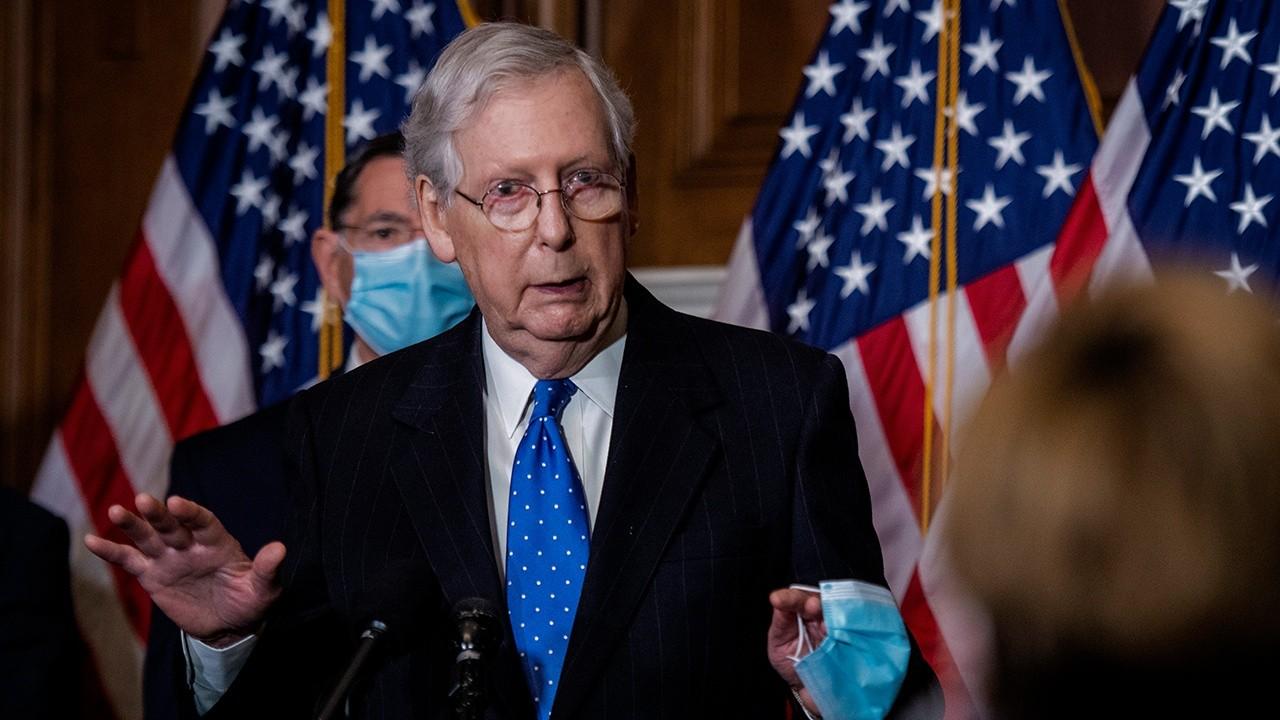Bipartisan COVID-19 relief deal faces congressional hurdles as McConnell refuses to endorse it
The $908B deal could fall apart unless GOP, Dems can compromise on key sticking points
Despite renewed momentum on Capitol Hill to pass a coronavirus relief deal, a bipartisan proposal unveiled last week has run into familiar obstacles, potentially thwarting the chances of a year-end agreement.
The biggest sticking points are ones that have plagued negotiations for months: Republicans maintain that a liability shield for businesses is needed, a "poison pill" for Democrats. At the same time, Democrats want to include billions in new funding for state and local governments, which their GOP colleagues have lambasted a "blue-state bailout."
Unless the two sides can compromise on the issues, the $908 billion deal could fall apart.
12 MILLION AMERICANS FACE LOSS OF UNEMPLOYMENT BENEFITS DAY AFTER CHRISTMAS
"State and local money is tied to liability protection," Sen. John Cornyn, R-Texas, said Monday. "So there's either going to be none for both of those or both of those that are going to be provided for. My hope is that we'll do both."
The aid package, details of which are set to be released Tuesday, allocates about $300 billion in funding for small businesses through the Paycheck Protection Program, $240 billion in aid for state and local governments, $180 billion to extend boosted unemployment benefits at $300 per week through March and includes liability protections for businesses that remain open during the pandemic.
It would also funnel $16 billion into vaccine distribution, testing, and contact tracing, put $82 billion into education and give $45 billion for transportation. The bill text has not been finalized yet.
An expanded group of bipartisan lawmakers met Monday evening to discuss liability protections. After the meeting, Sen. Mitt Romney, R-Utah, told reporters that it was a "productive meeting" with "good faith discussions."
CORONAVIRUS RELIEF DEAL TO BOOST WEEKLY JOBLESS AID BY $300 BUT WON'T INCLUDE STIMULUS CHECK
At issue for the group is how to retroactively protect businesses with one possibility being federal liability protection for coronavirus-related suits based on injuries that occurred in 2020. The group is weighing pausing potential lawsuits in 2021 to allow states to craft their own laws. An alternative, he said, is scrapping liability protections and state and local aid from the bill altogether.
"I think we may be able to get there," Romney said.
Securing a liability shield has been a top priority for Senate Majority Leader Mitch McConnell, who on Monday urged his Democratic counterpart, Chuck Schumer, to allow a vote on a targeted $500 billion bill that provides boosted unemployment aid, small-business aid, funding for vaccine distribution and liability protections.
“Drop the all-or-nothing tactics,” McConnell said on the Senate floor.
McConnell, who has yet to endorse the $908 billion offer, said he was "optimistic" that lawmakers could strike a deal, but said, "I have no report at the moment about how." Schumer and House Speaker Nancy Pelosi endorsed the $908 billion proposal last week, a stark reversal from previous months when they maintained that at least $2.2 trillion was needed in new funding.
BIDEN CALLS FOR ERASING SOME STUDENT LOAN DEBT, FACES PROGRESSIVE PRESSURE TO GO FURTHER
But the inclusion of liability protections for businesses has rankled some Democrats, who have suggested the issue is a non-starter.
Both Sens. Elizabeth Warren, D-Mass., and Bernie Sanders, I-Vt., warned that a shield against COVID-19-related lawsuits could make businesses too lax in protecting their employees from the virus.
“We cannot agree to release employers who have caused their employers to get sick or die from their responsibilities,” Warren said Monday. “COVID cases continue to climb and that means we need employers to be more vigilant, not less.”
Several lawmakers have also sounded the alarm over the lack of a second $1,200 stimulus check for American families still reeling from the crisis. Sanders said in a statement that unless the proposal was "significantly revised," he would not support it.
GET FOX BUSINESS ON THE GO BY CLICKING HERE
"It is unacceptable that the proposal does not even do what the CARES Act did and provide, at the very least, a $1,200 direct payment to working-class Americans and $500 for their kids," Sanders said. "Tens of millions of Americans living in desperation today would receive absolutely no financial help from this proposal. That is not acceptable."
Sen. Josh Hawley, R-Mo., has likewise said the relief bill needs to include direct payments for families and individuals -- and lobbied President Trump to veto the legislation absent funding for that.
“I said, ‘I think it's vital that any relief include direct payments, and I'm not gonna vote for it if it doesn't.’ And I also urged him to veto any bill that did not have direct payments in it,” Hawley told Politico.
The House will vote on a temporary funding measure Wednesday to keep the federal government running for an extra week, before the existing stopgap runs out on Friday night.




















